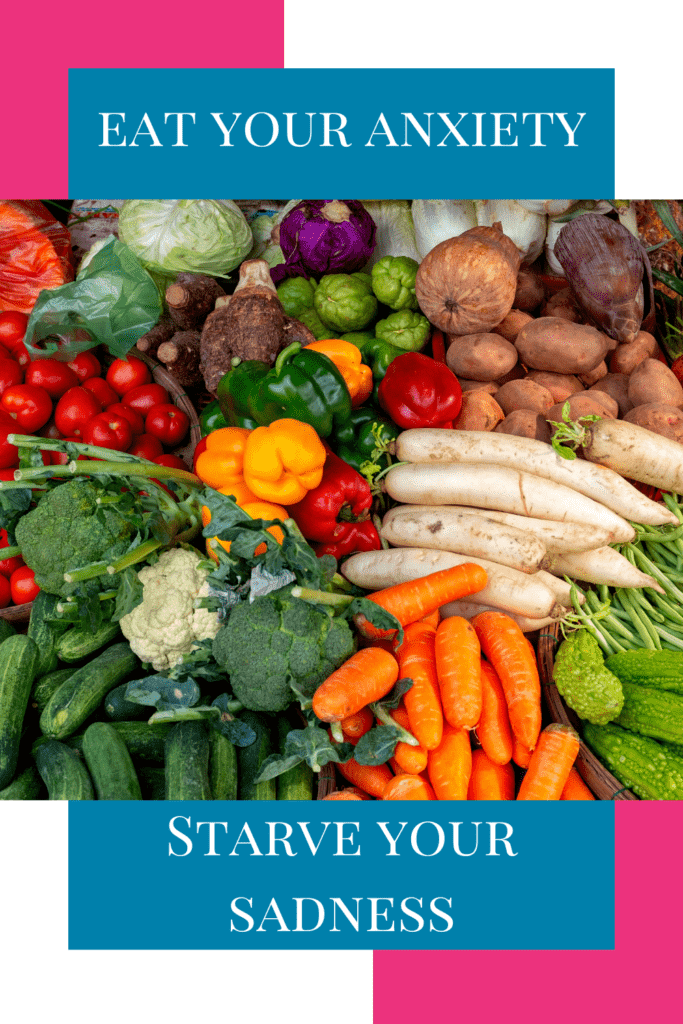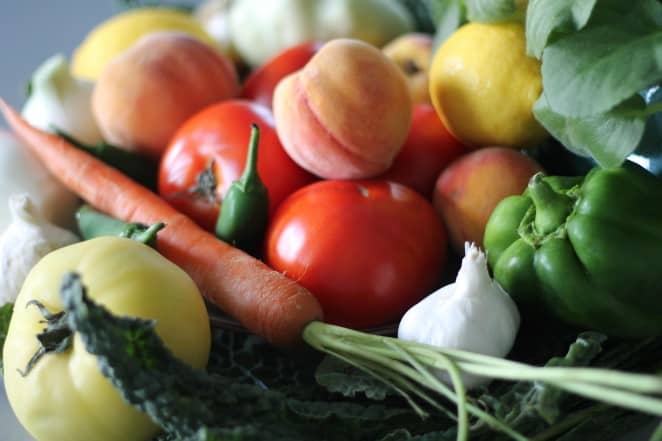 Managing anxiety and depression with diet is gaining increasing awareness as people are becoming more aware of the mind-body connection or what I like to refer to as ‘yes your head is attached to the rest of your body. You really can’t fully understand how much your diet impacts you mentally until you try it out firsthand. The bottom line is to eat well and feel well.
Managing anxiety and depression with diet is gaining increasing awareness as people are becoming more aware of the mind-body connection or what I like to refer to as ‘yes your head is attached to the rest of your body. You really can’t fully understand how much your diet impacts you mentally until you try it out firsthand. The bottom line is to eat well and feel well.
1) Eating Fat and Omega 3 and 6’s
I’ve mentioned in numerous posts in the past that over 60% of our brain is made of fat. The cells in our body are 50% cholesterol. This is why eating fat is absolutely essential to managing anxiety and also why high-fat foods like coconut oil, butter, avocado, oily fish, seeds, and nuts are so nourishing to the nervous system. Both unsaturated fats and saturated fats are necessary for hormone production.Your hormones do a lot more than affect your sex life. Your hormones affect your mood, digestion, energy levels, metabolism, sleep, and the list goes on. Dr. Sarah Conklin, who specializes in Cardiovascular Behavioral Medicine in the Department of Psychiatry at the University of Pittsburgh found that “individuals who consumed more omega-3 fatty acids in their diets had more gray matter volume in areas of the brain important for regulating mood”.
Because Omega 3’s and 6’s are needed to make hormones and chemicals in the brain (like dopamine and serotonin) that are responsible for happiness and well-being, it is no wonder that people following the ‘fat-free’ diet are more prone to problems with their moods as well as their hormones. In fact, people who are severely deficient in certain fats can suffer from everything from depression to schizophrenia. In recent years numerous nutritionists and integrative doctors have reported higher rates of hormonal imbalances, anxiety, and depression among their patients who were on low-fat diets (often women).
Belgium researchers at Antwerp’s University Hospital found that severely depressed patients had lower omega 3 fatty acid levels than mildly depressed patients. In this same study, the scientists at the National Institutes of Health also found that populations that consume higher dietary fats have a significantly lower rate of depression than societies that consume few dietary fats such as North America. Furthermore, unsaturated fats such as omega-three fatty acids prevent surges in cortisol and adrenaline (the stress hormones) thereby maintaining a more stable mood and realistic thought processes.
2 ) Protein
Eating sufficient protein is essential to overall health and mental health can greatly suffer if one is deficient. Protein, which is composed of various amino acids, is the building block of our body. Our muscles, skin, and bones are made of protein as well as the neurotransmitters in our brain. Neurotransmitters such as serotonin, dopamine, and GABA are responsible for a positive mood and feelings of calm. If we are not getting eating enough protein then our brains do not stand a chance of making the neurotransmitters that are responsible for feeling good.Whether you are eating a paleo or vegan diet, ensuring that you are eating adequate protein is important. Too much protein can also increase symptoms of anxiety. The key is eating balanced meals. Eating protein at every meal is essential to balancing blood sugar levels, thereby preventing crashes that can lead to feeling physically ill, anxiety attacks, and even ravenous cravings. As you can see, protein nourishes the body on every level. However, eating a steak at every meal is not necessary.
Protein is found in:
- nuts, seeds, hemp
- vegetables such as kale, spinach, broccoli
- eggs
- lentils, beans (edamame, chickpeas, kidney beans)
- quinoa (technically a seed and contains all essential amino acids)
- fish, chicken, red meat
3) Magnesium
This is a mineral in which Western culture is deficient in epidemic proportions due to soil depletion, processed food, city water that filters magnesium, and the fact that most of us no longer eat organ meats. Magnesium is responsible for over three hundred functions in the body. Deficiency in this important mineral can result in muscle spasms, heart arrhythmias, constipation, restless leg syndrome, anxiety, headaches, insomnia, and even seizures to name a few. Several studies have found that symptoms of anxiety and depression improved with supplementation of high-quality magnesium among patients who are deficient. While supplementing with magnesium is not a cure for anxiety, it may be helpful in managing anxiety. Bedtime is the optimum time to supplement as it will facilitate restful sleep.4) Probiotics
I explained in my previous post, Your Gut, Your Second Brain, how much gut health is in fact one of the most significant factors in mental health. If you need a reminder just remember that your gut is responsible for producing more serotonin (the happy chemical) than your brain. Eating food that is high in probiotics such as tempeh, kefir, Lassi (Indian Yoghurt drink), real sauerkraut (ingredients should be salt and water and cabbage, not vinegar) as well as fermented vegetables is the best way to increase the good microbes in your gut. Remember that processed, chemical, and sugar-laden foods all compromise the health of the good bacteria and nourish the bad guys. If you find you are having a hard time incorporating probiotic foods into your diet then consider supplementing with a high-quality probiotic found in the refrigerated section in health food stores and some grocery stores.5) B Vitamins
B Vitamins are required for almost all aspects of brain function, and like protein, B vitamins are responsible for manufacturing neurotransmitters such as dopamine. Deficiency in B vitamins can cause a range of mental health symptoms. A deficiency in B6 is related to confusion and depression. B6 is particularly effective in treating or managing pre-menstrual depression as well as symptoms experienced during pregnancy. B12 deficiency can present itself in everything from fatigue to paranoia. B12 is found is mostly found in animal products such as fish, eggs, and other meats which is why vegetarians and vegans are at increased risk of depression and anxiety if they do not supplement. However, B12 deficiency is common even among meat-eaters due to poor digestion or ‘leaky gut’, where nutrients do not get properly absorbed.I have only mentioned two important B vitamins here, but all of them are needed for mental stability. Because each type of B vitamin is present in various foods, eating a well-balanced diet is the best way to ensure you’re eating enough. Alcohol and sugar severely deplete B vitamins which is one of the reasons why many people feel depressed and anxious after a night of drinking.
6) Vitamin D
Increased intake of Vitamin D is linked to lower levels of depression as well as increased immunity. The good news is that for the most part, it is free. The best source of Vitamin D is from the sun. Going outside and getting sunlight (without sunscreen) on a regular basis is helpful. However, sun exposure is limited during the winter months for those living in the northern hemisphere. Supplementing with either a high-quality D3 supplement (powdered capsules are most easily digestible) is best. Cod liver oil, salmon, and chanterelle mushrooms are also natural sources of D3.7) Vegetables
Eating abundant amounts of vegetables is essential to ensuring that you are getting all the necessary minerals and B vitamins to combat anxiety. Furthermore, eating your greens and other detoxifying vegetables help your body to detoxify the chemicals, additives, and even the stress hormones that build up in your body. Make sure you are including hearty vegetables like root vegetables such as carrots and beets during times of stress as they are very grounding. Eating only salads of mixed greens and minimal protein is detoxifying, but it may not be enough to ground you during times of stress.8) Hydrotherapy
Like greens that detoxify, drinking sufficient water (8-10 glasses) is essential to moving stress hormones out of your body. Furthermore, water conducts electricity and you want to keep the electrical circuits in your body moving. Check out Lynne McTaggart’s book The Field and Gregg Braden’s book ‘The Divine Matrix’ to learn more about recent findings in science that we are energy not matter.Eating a mostly plant-based diet while adding sufficient protein (animal or plant-based) and some whole grains is the best way to ensure you are eating an anti-anxiety or anti-depression diet. Remember to include foods that are high in probiotics and reduce toxins such as sugar, alcohol, and processed food as they are not only void of nutrients, but deplete the nutrients that are already in your body.



